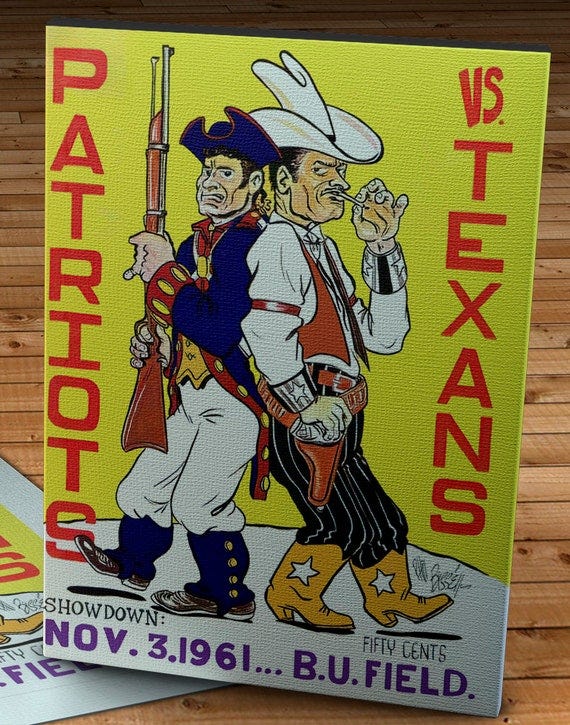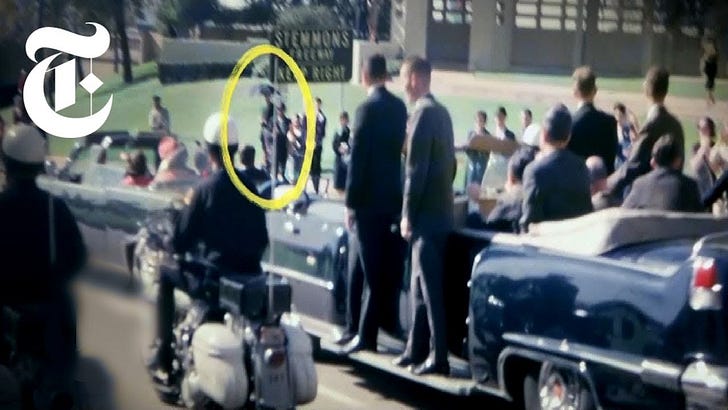Deus Ex Machina (1961)
What does one of the strangest endings to a game in football history have to do with A.I. chatbots?
This is Throwbacks, a newsletter by me, Michael Weinreb, about sports, history, culture and politics, and everything in-between.
If you like what you read, please click the button below, join the mailing list for FREE and please share, on social media or through e-mail or however you feel comfortable sharing.
And if you’ve been reading for a while, please consider a paid subscription to unlock certain posts and help keep this thing going—you’ll also get full access to the historical archive of over 250 articles. (Click here and you’ll get 20 percent off either a monthly or annual subscription for the first year.)
(If your subscription is up for renewal, just shoot me an email and I’ll figure out a way to get you that discount, as well. If you cannot afford a paid subscription and would like one, send me an email and I’ll comp you one, no questions asked.)
I.
One of the benefits of doing historical research as part of your job is that sometimes you stumble across something so utterly strange that you wonder how you went all these years without hearing about it in the first place. And that leads me to a Friday evening in Boston in November of 1961, and to the second season of an alternative professional football operation known as the American Football League.
On this night, at a frigid and wind-blown field near Boston University, the Boston Patriots were leading the Dallas Texans, 28-21. Neither of these teams was championship-worthy, but this game was close, and in the final seconds, with the Texans at the Patriots’ 1-yard line, a crowd five-deep had emerged from the stands and gathered around the perimeter of the end zone. Texans coach Hank Stram called a pass play, and quarterback Cotton Davidson saw wide receiver Chris Burford break open on a slant. Davidson threw, and somehow as Burford prepared to catch the game-tying touchdown, the ball fluttered up into the air and dropped to the grass. The fans rushed the field, and no one was entirely certain what just happened until the Texans watched the film the next day. And they saw this:
That is, quite literally, a man in a trenchcoat suddenly rushing the field to knock down Davidson’s pass, and then just as quickly disappearing into the night like the Umbrella Man at Dealey Plaza.
Afterward, Davidson insisted to Stram that a man had emerged from the crowd and blocked the pass. Stram assumed that Davidson had hit his head and hallucinated the whole thing. On the team plane, he sent the trainer back to examine Davidson. But then Stram got home and watched the film. Davidson was right. It had actually happened the way he said it did.
Six decades later, no one knows who that man was, although Patriots owner Billy Sullivan—known for wearing a London Fog-style trenchcoat—never actually denied the rumors that he might have been that man. Either way, this was perhaps the most literal example of a deus ex machina I had ever seen in a real-life sporting event, and here is how I know we are living in strange times, because I immediately began to wonder—as someone who harbors an embarrassing reserve of sports esoterica in his skull—how I had never heard about this before. And then for a brief moment, like Hank Stram with Cotton Davidson, I began to wonder if perhaps I was the one who had lost my grip on reality.
II.
On Monday—the same day it ran an utterly surreal headline in which the president of the United States declared he didn’t know whether it was his duty to uphold the Constitution—The New York Times ran a story about a central problem with artificial intelligence engines, which is that they seem to be increasingly making shit up out of thin air.
Allow me to repeat that: A.I. chatbots, whose increased presence are being framed as a watershed moment for the human race, are getting better at lying to us, and we have no idea why they are doing this or exactly how to make it stop.
“You spend a lot of time trying to figure out which responses are factual and which aren’t,” Pratik Verma, co-founder and chief executive of a company that “helps businesses navigate the hallucination problem,” told the Times. “Not dealing with these errors properly basically eliminates the value of A.I. systems, which are supposed to automate tasks for you.”
That is a remarkable paragraph for a number of reasons. The first is that there are now companies whose entire expressed purpose is to figure out ways to stop A.I. chatbots from lying to us. The second is that the founder of that company is essentially admitting that if this problem cannot be solved, than A.I. essentially loses any value it has, because it is not aiding society, but is contributing to the rot that has allowed increasingly erratic falsehoods and conspiracy theories to thrive, and that this thing meant to expand our understanding might actually lead us to doubt what we see with our own eyes.
III.
I am not here to fight the future. It is clear that A.I. has important qualities that can make our lives easier, but it also feels like we’re moving very fast with these things, and we all know we’re moving very fast with these things, and no one seems to know what to actually do about it.
A few days ago, I started reading George Orwell’s 1984 for the first time since the sixth grade, and in case you’ve forgotten, the job of the central character literally involves the erasure of history by constructing convenient lies to align with the Party’s preferred version of events. Over the course of the 20th century, 1984 became our shared vision of what a dystopia looks like. And yet one of the reasons we are where we are as a society is because we can no longer have a shared vision of much of anything, because we can no longer agree upon a common truth. And I am concerned that it’s started to affect the way we think about everything; I am concerned that it’s going to lead us to increasingly question or doubt or reframe history, because things are so overwhelmingly weird sometimes—and especially right now—that we begin to reject the evidence of our own eyes and ears.
“All the fans rushed the field and it was like everyone wasn’t sure what they saw,” Patriots defensive end Larry Eisenhauer told the Times back in 2012, about that insane Patriots-Texans finish. But then the Patriots watched the film and realized that this was not a hallucination. This was reality, as strange and incomprehensible as it might be.
This newsletter is very much a work in progress. Thoughts? Ideas for future editions? Contact me via twitter or at michaeliweinreb at gmail, or leave a comment below. If you enjoyed this newsletter, please subscribe and/or share it with others.




You're pretty erudite. For a Penn State grad. Excellent work.
This has to be AI generated, right? I grew up in New England and have never seen this. Crazy. Thanks for sharing.